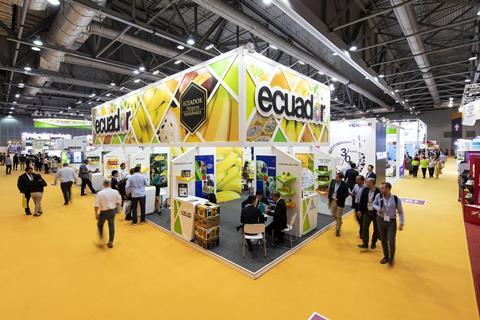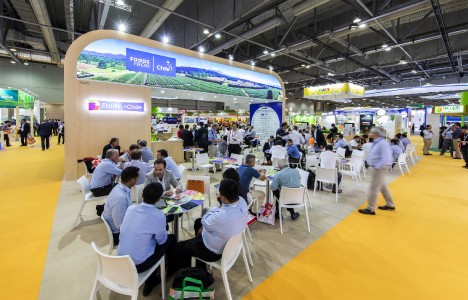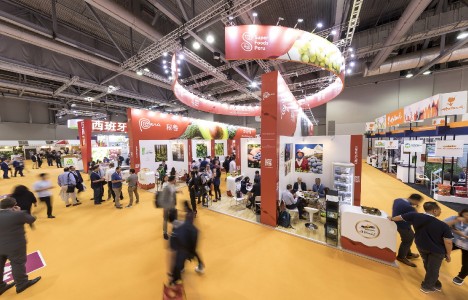
Fruitnet continues its series of exhibitor spotlights from Asia Fruit Logistica with a look at Latin America. During last week's show, the Fruitnet team spoke to some of the region's leading players about key developments and future prospects.
Altar Produce (Mexico)
The largest grower-shipper of fresh asparagus in Mexico, Altar Produce exhibited once again at Asia Fruit Logistica looking to expand its product offerings to the Asian market. “We started a broccoli-growing programme three years ago and have been exporting to both Japan and the US,” noted export sales manager Elizabeth Sandoval. “We also grow and pack brussel sprouts, which we ship to both Japan and Hong Kong.” Sandoval reported that Altar has recently begun growing blueberries and table grapes as well. “We have several hectares of blueberries planted south of Ensenada (Mexico) as well as new acreage of table grapes near Mexicali. Our strategy is to diversify our product base to be of better service to our customers.”
Extraberries (Argentina)
Australian-bred blueberry varieties will soon be grown by Extraberries in Argentina, and Gamorel in Uruguay, after an agreement was signed between the two companies and Australian blueberry breeder-marketer, Mountain Blue Orchards. Sales manager at Extraberries, Matias Noti, says the partnership has been in negotiation for some time. “We have been speaking with Mountain Blue for over two years. Our next step is to trial all of their varieties to see which ones are best suited to our conditions,” said Noti. The main objective will be to export to Asian markets, which was made easier earlier in the year when the Chinese government reduced tariffs on fresh blueberry imports from 30 per cent to 15 per cent.
Chilean Fruit Exporters Association / Asoex (Chile)
The Chilean Fruit Exporters Association (Asoex) had a significant presence at Asia Fruit Logistica once again, and director of marketing in Asia, Charif Christian Carvajal, said its focus was on building on existing relationships and campaigns in Asia. “We want to reinforce our promotional export campaigns in China, not only for cherries, but also for blueberries, table grapes, kiwifruit, plums, sugar plums and nectarines,” said Carvajal. “A lot more of Chile’s focus will be on Asia in general, and in the mid-term, China will probably become our most important export market.'

Camet Trading (Peru)
As one of Peru’s top exporters of Hass avocados, Camet Trading’s Asia representative, Charles Colmenares, highlighted the opportunities to meet existing clients and discuss new opportunities while at Asia Fruit Logistica. “We’ve been able to meet with our clients from across Asia, including China, Japan, Korea and Thailand. The conversations have all been productive,' said Colmenares. Alongside avocados, Camet Trading, which is owned by South African organisation, Westfalia Fruit, is hoping to expand its production of mandarins, which Colmenares is quietly confident about. “We are well positioned to be competitive, as we produce at a different time to China,” he said.
Tutii Fruit (Colombia)
Colombia-based exporter of fresh, dried and frozen produce Tutii Fruit was the exhibitor from the Latin American country at this year’s Asia Fruit Logistica. Representative Nicolas Lennis hopes there will be a greater Colombian presence at future events. “Sure it is a challenge, but I see our presence as a step in the right direction, and I hope that we can encourage more Colombian businesses to take part next year.” Tutii Fruit showcased a range of Colombian produce, including passionfruit, bananas and avocados, as well as the highly sought-after cherimoya.
Procomer (Costa Rica)
Procomer helps develop and promote exports of Costa Rican produce around the world, with its main focus centered on improving market access in Asia. Foreign trade promoter, Juan Carlos Vindas Martinez, said the agency is hoping to increase exports of Costa Rican pineapples and bananas to Asia, but acknowledges there is strong competition from regional exporting countries, including Vietnam and the Philippines. “We are working hard to introduce our produce to customers outside of the US and Europe,” he said. “Once consumers try our fruit, they will know it’s the best in the world.”
Agzulasa (Ecuador)
Agzulasa, which markets bananas under the Ecuasabor brand, returned to Asia Fruit Logistica for a seventh time, focusing on the export of Ecuadorian bananas to markets across the world. An estimated 30 per cent of Agzulasa’s production is shipped to Asia each year. General manager Marinella Ubilla said a number of challenges were facing Ecuador’s banana industry. “The arrival of tropical race 4 (TR4) disease in neighbouring Colombia is a concern, but we are committed to working with other Latin American countries to find a solution and to develop a new variety that can resist the disease,” she said. Ubilla firmly believes Ecuador must modernise its techniques in order to prevent any potential outbreak of TR4 domestically. “We must teach the workers that have to take more care, cleaning their shoes and their tools, and we must modernise the industry to be able to detect any future issues, but this will increase the cost per hectare, which increases the sale price.”
PromPeru (Peru)
As the official Partner Country of Asia Fruit Logistica, Peru sent its largest-ever delegation to Asia Fruit Logistica, where its rapid growth as a producer and exporter was in the spotlight. Peru had 60 companies and more than 20 sector associations showcasing 300 products as it looked to capitalise on its strong trade with Asia. Mario Ocharan, export director at PromPeru, Peru’s export and tourism board, said the growth experienced in Asia has been promising. “Table grapes are still our biggest export to Asia, earning US$180m in 2018, but we are now seeing rapid growth in avocados and blueberries. The value of avocado exports almost doubled to A$57m last year, while blueberry exports increased to US$47m,” said Ocharan. “The main challenge facing our growth is branding; we need our branding to make a difference. Our Superfoods [from Peru campaign] has worked well, and over the next few years we’ll be promoting Peru through gastronomy and restaurants.”




